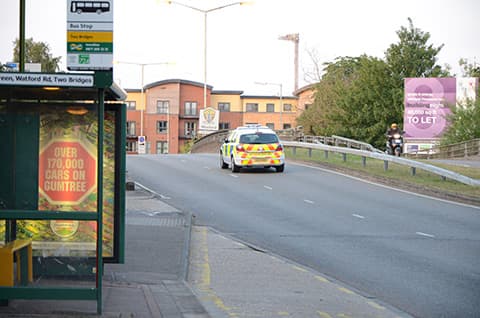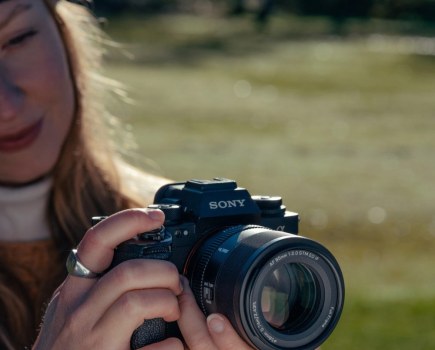One of the photographers, Kyle Adams, took this shot of the police car afterwards, as a record of the incident, having missed the picture he had wanted [Picture credit: Kyle Adams]
Since the government changed anti-terror laws three years ago, there have been relatively few reports of police stops on photography enthusiasts.
However, it seems photographers with DSLRs can still attract unwelcome attention.
Kyle Adams, who was using a Nikon D7000 and George Anastasi, a D5100, say they were left stunned when officers quizzed them as they tried to take pictures from a pavement next to the A412 in Hertfordshire, a public place.
The pair, both 26, had recently completed a 10-week beginners DSLR photography course and set off for Croxley Green in search of a subject to try out their skills on a moving subject.
They had taken photos of nearby barges and bridges, before they selected their next subject – a moving police car complete with flashing blue light.
‘We heard a police car siren coming from Rickmansworth Road or Ascot Road… We thought this would make a good picture – with the classic movement in the background with the car in focus,’ recalled Adams after the incident on the evening of 4 July.
‘As we took the first shots, the blue lights went out and the siren stopped.’
According to Adams, the officers approached the pair after parking their car nearby, asking them: ‘What are you taking pictures of guys?’
Adams told Amateur Photographer (AP): ‘Both George and I were a little shocked and hesitantly replied “anything and everything really”.
‘At no point did they state why, or under what act there were stopping us.’
Adams, who described the experience as ‘nerve-wracking’, said the officers asked them for ID and then radioed colleagues to run checks after they produced their driving licences.
‘We explained we were photographers and thought the shot of an accelerating police car with blue light flashing would make a good photo.’
Terrorism fears?
‘We were told “in this day and age you just can’t be too sure about people… to do with terrorism etc”.’
Adams says their experience shows that people with DSLRs continue to be unfairly targeted, in contrast, he says, to those with smartphones who ‘seem to be able to take pictures anywhere without any hassle…’
The pair hadn’t managed to get the image they wanted anyway, as the officers had switched off the blue light before any pictures were taken.

Earlier, the photographers had practised their DSLR skills on these local barges [picture credit: Kyle Adams]
The officers told the photographers they had switched off the car’s emergency lights as they been called off the previous job.
Police took no action against the pair and the officers said they were free to carry on taking pictures.
But they were left wondering why they had been stopped in the first place.
Adams was so concerned that he photographed the police car’s registration number, in case he decided to seek advice on the incident afterwards (see picture above).
Hertfordshire Police have yet to track down the officers involved to establish a reason for the stop, but in a statement released to AP a spokesman said: ‘It is in the public interest for our police officers to be curious about behaviour that is out of the normal routine or where an issue like road safety might be at stake.
‘The Force recognises that the public duty also has to be balanced against the public interest for law-abiding members of the public to be able to go about their normal business unhindered.
‘Through the course of their duty, police officers have to make many decisions about whether it is necessary to stop or challenge someone, knowing that in some cases they will have stopped someone who it transpires is just going about their daily routine.
‘We hope in those instances that the public understands our wider responsibility around protection and exercises patience while appropriate checks are completed and they can then go on their way.’







